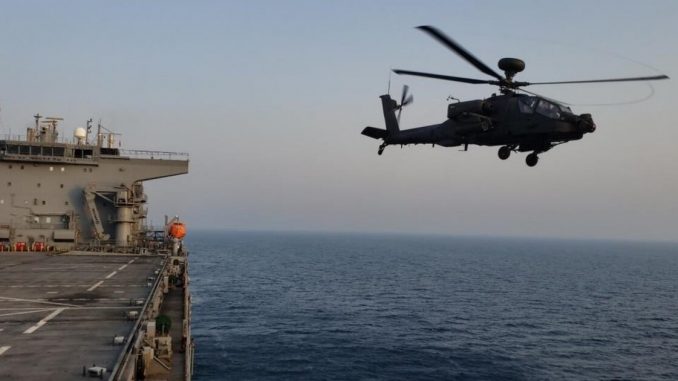
U.S. Navy and Air Force troops joined with United Arab Emirates pilots recently to conduct combined naval and air training operations in the southern Persian Gulf.
The training exercise, June 21-25, included using the expeditionary mobile base Lewis B. Puller as a staging platform to practice tracking and engaging simulated fast-attack craft.
UAE’s Joint Aviation Command worked with Navy and Air Force assets in U.S. Central Command, including the Navy’s P-8 Poseidon maritime patrol aircraft and reconnaissance aircraft assigned to AFCENT Air Warfare Center at Al Dhafra Air Base, UAE, the DoD reported.
UAE pilots also conducted day and night landings aboard the Puller, using CH-47F Chinooks, AH-64D Apaches, UH-60M Black Hawks and Bell 407 utility helicopters to complete deck landing qualifications.
“These training opportunities reinforce partnership commitments in the region, enhance interoperability, and demonstrate UAE and U.S. resolve to respond to threats in the region,” Brig. Gen. Matthew Trollinger, commander of Task Force 51/5th Marine Expeditionary Brigade. said in the same DoD release.
Puller supports the task force’s broad range of missions in U.S. 5th Fleet, including crisis response, airborne mine countermeasures, counter-piracy operations, maritime security operations and humanitarian assistance/disaster.
Iranian fast boats have been harassing U.S. warships and other ships in the Gulf for years.
On April 15, for example, U.S. Navy Forces Central Command detailed in a news release that Islamic Revolutionary Guard Corps vessels “repeatedly conducted dangerous and harassing approaches” of several U.S. warships while the American vessels were conducting air integration exercises with Army AH-64E Apache attack helicopters.
The 11 Iranian ships carried out an “unsafe” and “unprofessional” interaction with the Puller, the destroyer Paul Hamilton, coastal patrol boat Firebolt, patrol ship Sirocco, and Coast Guard ships Wrangell and Maui.
A week later, President Donald Trump tweeted that he had instructed the Navy to “destroy” any Iranian gunboats that harass American warships at sea.
“I have instructed the United States Navy to shoot down and destroy any and all Iranian gunboats if they harass our ships at sea,” Trump tweeted.
Senior Pentagon officials gave no indication the president had directed a fundamental change in military policy on Iran.
“The president issued an important warning to the Iranians,” David Norquist, the deputy secretary of defense, said at a Pentagon news conference when asked about the tweet. “What he was emphasizing is, all of our ships retain the right of self defense.” Norquist called the tweet “a very useful thing.”
The Emirates have their own reasons for concern. In May 2019, fast boats from Iran may have been involved in an attack on international shipping. Four oil tankers off the coast of the United Arab Emirates were attacked with what U.S. authorities have described as limpet mines attached to their hulls. The U.S. Later released video of a a fast-boat crew removing one of the magnetic mines from another ship.
The UAE is a key U.S. ally in the Persian Gulf and has provided assistance in many conflicts in the Middle East including the war in Afghanistan, the Gulf War, and the fight against ISIS.
/cloudfront-us-east-1.images.arcpublishing.com/mco/GOLJMVF4VFBNVKKFTESHOMPOHE.JPG)



Be the first to comment